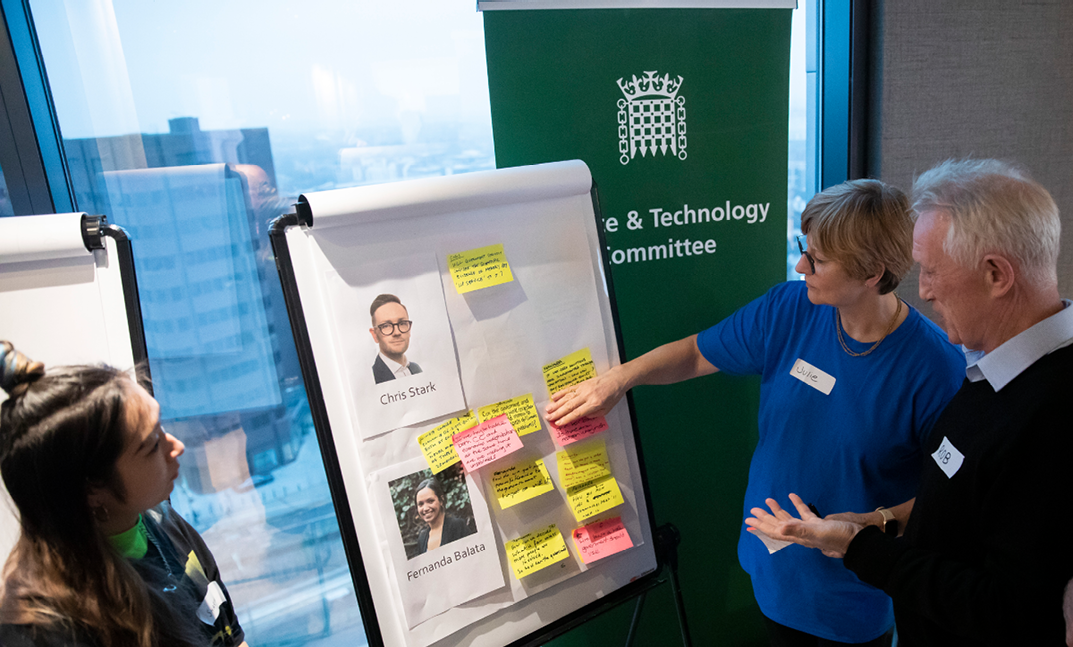Underpinning principles

Previous section: About Climate Assembly UK
(Contents)
Assembly members' first decision focussed on the principles that should underpin the UK's path to net zero. They agreed twenty-five underpinning principles, then used a vote to prioritise them.
The principles form part of the assembly's recommendations to government and Parliament. Assembly members also used them to inform their own work.
All assembly members took part in the discussions about underpinning principles, which took place at the first assembly weekend. They drew on their own experiences, values and views, as well as evidence from the assembly's first three panels of speakers.1These panels covered an introduction to climate change, and different perspectives on overarching ethical, practical and strategic questions about the path to net zero. All the speakers gave presentations to the assembly and were then questioned by its members.
Notes ():
1: The assembly heard from nine speakers across its first three panels: Professor Joanna Haigh, Imperial College London (informant); Professor Ed Hawkins, University of Reading (informant); Professor Rebecca Willis, University of Lancaster (informant); Chris Stark, Committee on Climate Change (informant); Fernanda Balata, New Economics Foundation (advocate); Professor Paul Ekins, University College London (advocate); Modi Mwatsama, Wellcome (advocate); Tony Juniper, Natural England (advocate); Kirsten Leggatt, 2050 Climate Group (advocate). All speakers' presentations are available as slides, videos and transcripts at climateassembly.uk/resources/. An 'informant' is a speaker who we asked to cover the range of views and available evidence on a topic. An 'advocate' is a speaker who we asked to give their own view, or the view of their organisation. Assembly members knew whether speakers were informants or advocates.
Assembly members began their decision-making process after the first two panels of speakers. They started by considering individually how they would finish the sentence:
"The UK's path to net zero by 2050 should be underpinned by the principles of…."
They then discussed their views in small groups at their tables, with each table agreeing their four priority responses. These responses had to, between them, represent the range of opinions at the table.
While assembly members listened to and questioned the third panel of speakers, facilitators took these responses and grouped similar ideas together to form a draft ballot paper, overseen by an official from Parliament. They presented the draft back to assembly members, who had the opportunity to note any omissions or suggest changes. Facilitators then made these amends. Tables also discussed and added additional ideas based on the evidence they heard from Panel Three.
The final ballot paper included twenty-five principles that assembly members believe should underpin the path to net zero.
The vote asked assembly members to prioritise the twenty-five principles that they had developed. Each assembly member could vote for the eight options that they saw as the highest priority.
It is important to note that the results of the vote therefore show priorities not levels of support. A lack of votes does not necessarily signal that assembly members disagreed with an idea, just that they saw it as less important.
The results of the vote were as follows.
Principles prioritised by over half of all assembly members
- Informing and educating everyone (the public, industry, individuals and government) – 74 votes
- Fairness within the UK, including for the most vulnerable (affordability, jobs, UK regions, incentives and rewards) in actions, not just words – 65 votes
- Leadership from government that is clear, proactive, accountable and consistent (cross-party consenus) – 63 votes
- Protecting and restoring the natural world – 59 votes
Principles prioritised by over a third of all assembly members
- Ensuring solutions are future-proofed and sustainable for the future – 45 votes
- A joined up approach across the system and all levels of society (working together, collaborating, and sharing) – 40 votes
- Long-term planning and a phased transition – 39 votes
- Urgency – 37 votes
- Support for sustainable growth (including pioneering innovation) – 37 votes
Additional principles agreed by the assembly
- Local community engagement embedded in national solutions – 33 votes
- Think about our impact globally and be a global leader – 32 votes
- Use of mix of natural and technological solutions – 32 votes
- Transparency and honesty – 32 votes
- Underpinned by scientific evidence and focused on the big wins – 29 votes
- Equality of responsibility for individuals, government and business – 28 votes
- Achievable – 27 votes
- Everyone should have a voice (e.g. via local representation and participation, or in holding government to account) – 27 votes
- Regular independent checks on progress – 27 votes
- Fairness for the most vulnerable globally (less developed countries) – 24 votes
- Making the most of potential benefits for everyone (e.g. health, wellbeing and the economy) – 24 votes
- Enabling and not restricting individual choice – 23 votes
- Protect the UK economy, including from global competition – 18 votes
- Compromise about changing lifestyles – 15 votes
- Those who bear the most responsibility should act – 13 votes
- Not negatively impacting other institutions – 4 votes
The top nine principles – those prioritised by over a third of assembly members – were displayed in the assembly rooms throughout the remaining weekends. We also gave assembly members hard copies of the full vote results to refer to during their discussions.
Assembly members returned to these principles, and considerations related to them, throughout the rest of the assembly.
Above : Assembly members discuss the issues.
Next section: How we travel on land
(Contents)
Footnotes
1 The assembly heard from nine speakers across its first three panels: Professor Joanna Haigh, Imperial College London (informant); Professor Ed Hawkins, University of Reading (informant); Professor Rebecca Willis, University of Lancaster (informant); Chris Stark, Committee on Climate Change (informant); Fernanda Balata, New Economics Foundation (advocate); Professor Paul Ekins, University College London (advocate); Modi Mwatsama, Wellcome (advocate); Tony Juniper, Natural England (advocate); Kirsten Leggatt, 2050 Climate Group (advocate). All speakers' presentations are available as slides, videos and transcripts at climateassembly.uk/resources/. An 'informant' is a speaker who we asked to cover the range of views and available evidence on a topic. An 'advocate' is a speaker who we asked to give their own view, or the view of their organisation. Assembly members knew whether speakers were informants or advocates.
